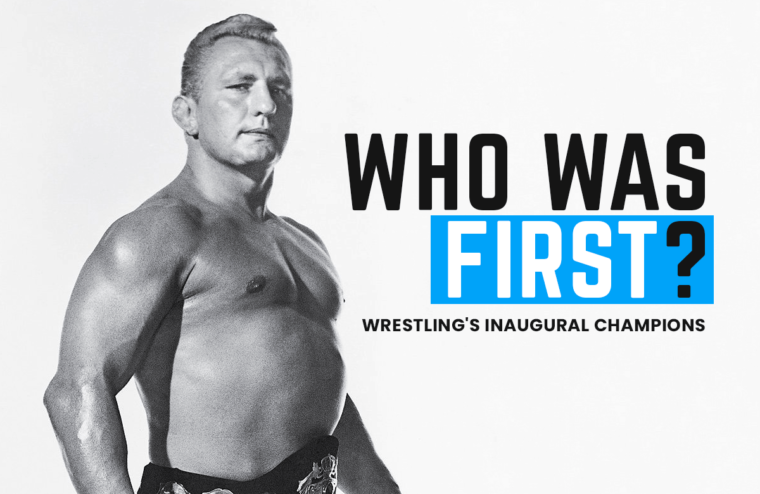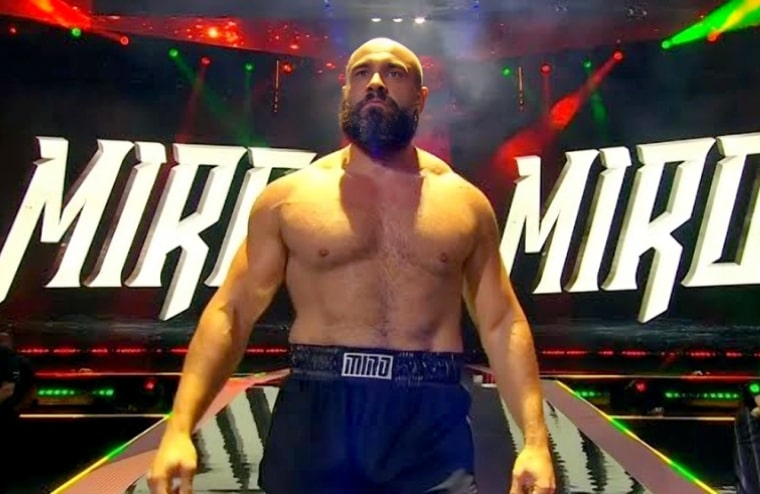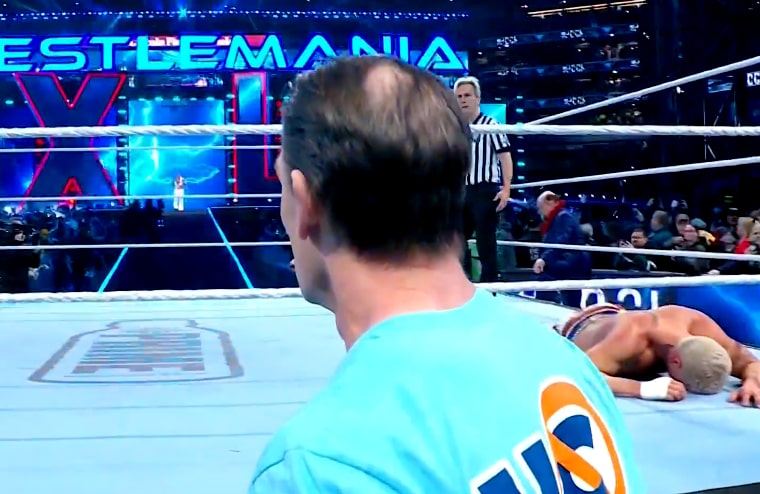Last weekend, Chris Jericho defeated Hangman Page to become the inaugural All Elite Wrestling World Champion. It has been well documented how Jericho celebrated with “a little bit of the bubbly” and then had the title temporarily removed from his grasp (since returned), but Jericho’s win made me think about the first top champion for other organizations. Obviously, Jericho’s name value and popularity make him a good flag-bearer for a promotion that is looking to bring in a mainstream audience on a major cable network (and I’m not just saying that because this is his website).
As I reviewed the list of inaugural top title holders, I found a rather unique mix of legendary champions, confusing title creations, and interesting trivia notes. Here’s a look at the inaugural top champions for nine North American based companies through the years.
1948 – National Wrestling Alliance – Orville Brown
This is a classic wrestling trivia question. Who was the first National Wrestling Alliance World Heavyweight Champion? Orville Brown, who held one of the various incarnations of a “World Title” at the time, was recognized as champion when the NWA was first founded in July 1948. However, Brown would have his career ended in an automobile accident in 1949. Lou Thesz, who was the reigning National Wrestling ASSOCIATION champion, was given the National Wrestling ALLIANCE designation as well. Thesz would go on to defeat Baron Michele Leone for the Los Angeles-based version of the World Title three years later, creating the undisputed version of the World Championship (well, until some promoter decided to dispute it because they wanted their own World Title). Thesz, one of the greatest wrestlers in the history of the business, is generally credited with lifting the NWA World Title to the lofty status it would enjoy for decades after. He just wasn’t the first to hold it.
The history of the NWA World Championship could take up several articles. From the “traveling champion” of the 70’s and 80’s to it becoming the centerpiece of Jim Crockett Promotions to the numerous revivals of the championship, it has been through a lot. Currently, Nick Aldis is recognized as the NWA World Champion, although the lineage has had numerous stops and starts in recent years.
1960 – American Wrestling Association – Pat O’Connor
When it comes to booking yourself on top, no one did it any better (or for longer) than Verne Gagne. In May of 1960, Gagne separated his Minnesota-based NWA territory away from the National Wrestling Alliance, creating the American Wrestling Association. It recognized then-NWA World Champion Pat O’Connor as the inaugural AWA World Champion, and he was given 90 days to defend the title against Gagne. Of course, O’Connor was with the NWA and wasn’t going to wrestle Gagne, so on August 16, 1960, Verne Gagne was awarded the AWA World Title for the first of what would be 10 title reigns, totaling more than 4,500 days with the title between 1960 and 1980, including one stretch from 1968 until 1975.
Obviously, the promotion was built around Gagne, and he even beat Nick Bockwinkel in his retirement match for the championship, which was then given back to Bockwinkel (what a great way to kick of a title reign, by losing the belt and then being given the belt back because your opponent retired). Maybe we shouldn’t be shocked that the AWA only lasted one decade following Gagne’s last title win. Then again, maybe we should be more shocked he didn’t come back for one more run with the belt.
1963 – World Wide Wrestling Federation (WWE) – Buddy Rogers
So, how and when exactly did Buddy Rogers become WWWF World Champion, the top title for what we now know as WWE? Well, if you watched TV at the time, you were told Rogers on a tournament in Rio De Janeiro for the belt, but that never happened. Rogers had been NWA World Champion but lost the title to Lou Thesz on January 24, 1963 in a one-fall match (title matches at the time were usually three falls). Vince McMahon Sr. and Toots Mondt, who promoted in the Northeast, refused to recognize the title change and broke away from the NWA to create the World Wide Wrestling Federation. Rogers was billed as their champion and was given the first WWWF World Title belt on April 11, 1963. However, some title histories, including WWE’s, list Rogers as getting the championship on April 25, 1963.
Regardless, Rogers was really a transitional champion here, as he would lose the title to Bruno Sammartino on May 17, 1963 at Madison Square Garden in New York City. The WWWF would build itself on Bruno’s back, as his seven year-plus reign established the promotion, which would eventually become the WWF and is now known as World Wrestling Entertainment. The title lineage for the championship was rather straightforward until the company would attempt various “brand splits” and create separate top championships, which would later be unified, then attempted again. However, it all leads back to Bruno winning the title from Rogers, who was the first champion (regardless of how it happened).
1986 – World Class Championship Wrestling – Rick Rude
World Class Championship Wrestling had made huge inroads as a television product in the mid-80’s, even though Fritz Von Erich rarely ventured outside of his home Texas market with live events. However, frustrated with his inability to get an NWA World Title reign for one of his sons again following Kerry Von Erich’s brief 1984 run, Fritz pulled out of the NWA in February of 1986 and the promotion declared their current American Heavyweight Champion, Rick Rude, the first World Class Championship Wrestling World Heavyweight Champion. Rude, managed by Percy Pringle, was getting his first run on top of a territory, but at that point was not the major star he would become a few years later. It was assumed by many that Rude was just a champion of convenience, and he would drop the title to Kerry sooner than later. However, Kerry’s famed motorcycle accident a few months later changed plans. Rude would drop the title to Chris Adams before heading to the NWA for tag team run with Manny Fernandez before beginning his celebrated WWF run. Interesting to note, eight months after leaving the NWA, the World Title would finally go to a Von Erich, but it would be Kevin, who defeated Black Bart for the belt, ending his less than one month run as champion.
While World Class had television penetration, their champion wasn’t appearing in as many parts of the country as the NWA and WWF Champion were, and the title was never recognized as an “official” World Title by Pro Wrestling Illustrated (back in the 80’s, that was a big deal). When people look back on Rick Rude’s career, rarely is his World Class run even mentioned, as it was totally overshadowed by his massive WWF and WCW success. In hindsight, this was Rude’s first taste of a spotlight that he would get on a much bigger staged in the years to come.
1986 – Universal Wrestling Federation – Terry Gordy
1986 was the year for regional companies trying to go national, as three months after World Class staked their claim to a World Championship, Bill Watts’ Mid-South Championship Wrestling underwent a makeover an renamed itself the Universal Wrestling Federation. Their current top titleholder, North American Champion Hacksaw Jim Duggan, vacated his championship and a tournament was held to crown the first UWF Champion. In a bit of a surprise, Terry Gordy of the Fabulous Freebirds took down Koko B. Ware, Ted DiBiase, Steve Williams and Duggan (the latter three being the top babyfaces in the company at the time) to win the title. While many saw Michael Hayes as the more marketable Freebird due to his charisma, Gordy as champion established that the UWF was going to be a company that put the premium on toughness over showmanship. Gordy would hold the title for six months before having to forfeit the title to fellow heel One Man Gang due to injury. Interesting to note, Gang had sneak attacked Duggan while Gordy watched prior to his tournament win.
Gordy’s UWF run was his biggest singles success in the U.S., although he would have greater success in All Japan Pro Wrestling where he held the prestigious Triple Crown title. The UWF’s grand expansion plan never got off the ground due to a combination of economic issues in the company’s homebase of Oklahoma and Louisiana and WWF signing away top stars (including Duggan and DiBiase). The UWF Championship was actually held by three consecutive heels (Big Bubba Rogers beating One Man Gang for it) before Steve Williams became the first, and only, babyface UWF Champion before the company was absorbed by Jim Crockett promotions in 1987.
1991 – World Championship Wrestling – Ric Flair
Unlike Ring Of Honor, which has a very easy to follow World Title history, the WCW World Championship was created in a cloud of confusion that some still argue about to this day. As 1990 drew to a close, Sting was the NWA World Heavyweight Champion. On January 11, 1991, Ric Flair defeated him, winning the iconic “Big Gold Belt.” However, during this reign, Flair was referred to as being the WCW World Heavyweight Champion, as the Ted Turner owned company was parting ways with the NWA. So, this was Flair’s first WCW World Title reign… or, it was his 16th NWA World Title reign. Flair ended up leaving WCW six months later after a dispute with new boss Jim Herd. Flair took the Big Gold Belt to the WWF with him, while WCW crowned Lex Luger the new WCW World Champion in July 1991 at the Great American Bash after beating Barry Windham. However, the NWA didn’t recognize Luger as champion, and the title went vacant until New Japan Pro Wrestling revived it in 1992.
The WCW World Title lineage after Luger was awarded the title is a fairly clear, but the company did a nice job mucking it up a few times by having the NWA World Title return, then there was the WCW International Title (both represented by the Big Gold Belt) defended alongside the WCW World strap. Of course, the title lineage took a further beating in the final months of the company, changing hands or being vacated 25 times in 2000. Booker T beat Scott Steiner in March 2001 on the final Nitro to retire the title… until WWE brought it back in July 2001 for six months (and seven more title changes).
1994 – Extreme Championship Wrestling – Shane Douglas
Technically, the first ECW Champion was Jimmy Snuka, who beat Sal Bellomo in April of 1992. However, that was the Eastern Championship Wrestling Championship, which is what Shane Douglas held in 1994 when the company participated in a tournament to crown a new NWA World Heavyweight Champion. Douglas defeated The Tazmaniac (Taz), Dean Malenko and 2 Cold Scorpio to win the tournament. After the match, Douglas famously threw down the NWA World Title belt, and held up his ECW strap, proclaiming himself the first ECW World Champion. The company then changed the name from Eastern to Extreme, and the era of ECW truly began. The company was a hardcore alternative to the family-friendly product WWF and WCW were producing at the time, and Douglas would lead the company as the first World Champion for a year before losing the title to the Sandman.
The story of ECW is one that has been told many times, so it doesn’t need to be repeated here. For over six years after Shane Douglas proclaimed himself the first ECW World Champion, the company cultivated a loyal following that has resulted in the popularity of the brand outlasting the actual existence of the company threefold. 18 years later, people still talk about ECW.
2002/2003 – Ring Of Honor – Low Ki/Samoa Joe
In 2001, WWF had won the “Wrestling Wars” by purchasing WCW and watching ECW close due to bankruptcy. In response, 2002 saw the birth of Ring Of Honor, assembling many top independent workers to fill the void left, particularly in the Northeast. Low Ki would become the first Ring Of Honor Champion, defeating Christopher Daniels, Spanky (Brian Kendrick) and Doug Williams in a four-way 60-minute Ironman match in July 2002. Low Ki was considered to be the cream of the crop of the Northeast independent scene at the time, so it was a shock that his title reign lasted less than two months, with him dropping the title to Xavier that September. Xavier would defend the title for half a year before dropping it to Samoa Joe on March 22, 2003. Two months later, it would be renamed the Ring Of Honor World Championship. Some would argue that the “World” designation didn’t hold the same meaning as it did in the 70’s and 80’s, but this seemed to be more an acknowledgment that Ring Of Honor was going to be far more than a once-a-month Philadelphia based company. The issue here is whether you consider Low Ki and Xavier part of the “World” Title lineage, even though it wasn’t called that until Joe’s reign.
Samoa Joe’s 21-month reign is still the single longest in ROH history and it cannot be understated how important it was in elevating the company in the eyes of the fans. Ring Of Honor became a platform for launching a slew of today’s stars, including (but not limited to) CM Punk, Kevin Owens (Steen), and Daniel Bryan (Bryan Danielson). It also became a viable alternative product for fans who wanted a more “wrestling-oriented” product. Ring Of Honor has lasted seventeen years, far outlasting many other companies who have claimed a “World” champion.
2007 – Impact Wrestling – Kurt Angle
This one can be rather confusing when trying to determine who the “first” champion is. Technically, Total Nonstop Action started with the NWA World Title as their top belt, which was won by Ken Shamrock on their first event in June of 2002. However, TNA separated from the NWA in 2007, and on that same day, Kurt Angle defeated champion Christian and Sting in a three-way match to become the first recognized TNA World Heavyweight Champion. That title then went through another name change ten years later on March 2, 2017 when then-champion Bobby Lashley would have his title renamed the Impact Wrestling World Champion, as the company was renamed Impact Wrestling from TNA.
However, there were more name changes to come. Six months after becoming the Impact World Championship, the title was unified with the Global Force Wrestling Global Championship as Albert El Patron defeated Lashley, and that new title was referred to as the Unified GFW World Heavyweight Championship. Then the title was vacated, and Eli Drake won it in a Gauntlet For The Gold match in August 2017. That same month, it was renamed the Impact Global Championship. In 2018, during Austin Aries run with the title, it was renamed the Impact Wrestling World Championship (again), and later combined with the Impact Grand Championship. Brian Cage currently holds the title, which is the Impact World Championship (unless they decide to change it again). The lineage goes back to Kurt Angle’s win in 2007, since that is when it splintered away from the NWA Title.
You can check out last week’s column, “Wrestling’s Greatest Retirements… That Weren’t” and all of my past work here on WebIsJericho.com.
- The ECW Matches We Didn’t Get: Shane Douglas vs. Brian Pillman - May 8, 2021
- The ECW Matches We Didn’t Get: Public Enemy vs. Bubba Ray & D-Von Dudley - April 14, 2021
- The ECW Matches We Didn’t Get: Mike Awesome vs. Rob Van Dam - April 4, 2021




